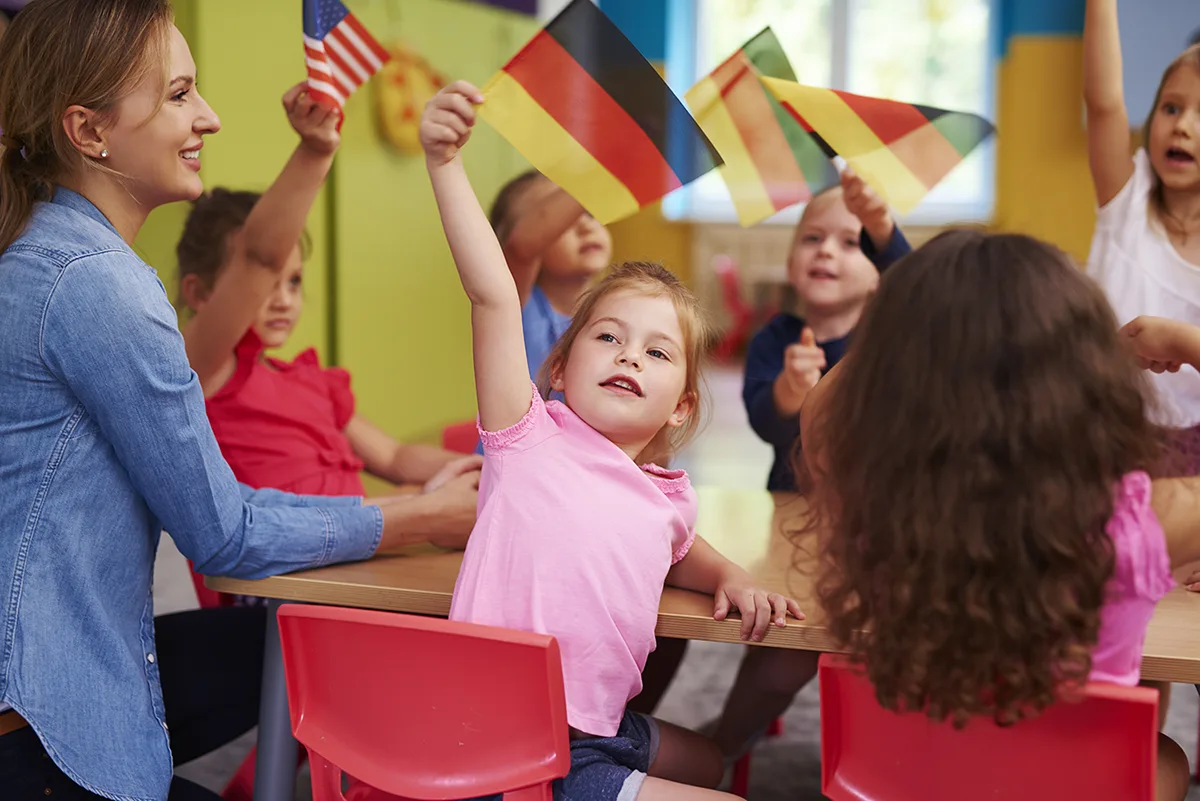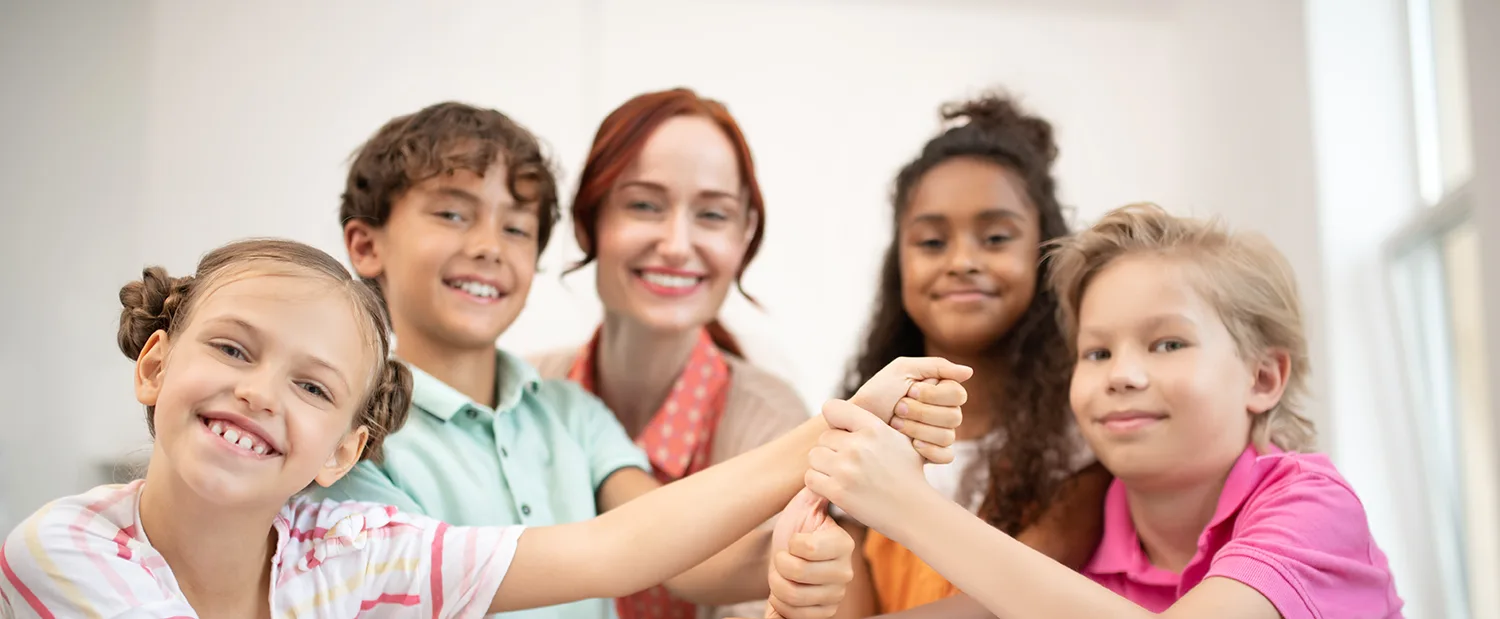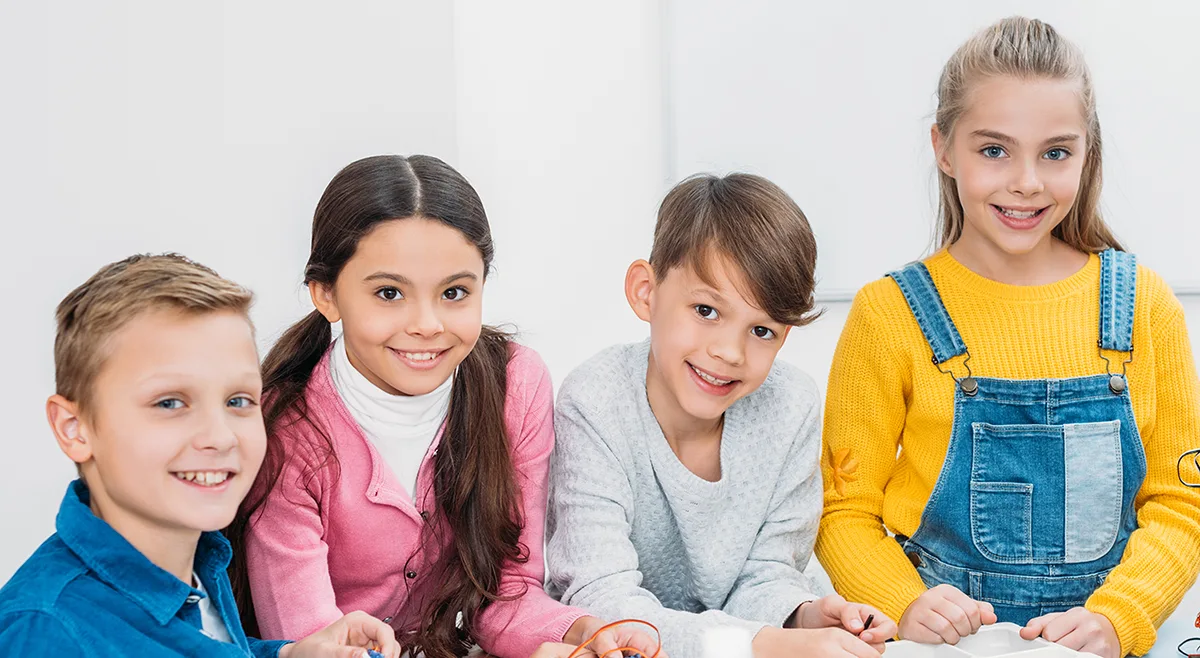How can you make learning German fun for children?
Learning German for children can be an exciting and fun experience. Through creative activities, they can playfully explore the language and increase their interest in learning German. Here are five creative activities that are not only fun, but also specifically designed to get children excited about learning German:
1. learning German for children through language games
Language games offer a dynamic and interactive way of learning German for children for children. Through the playful nature of these activities, children can not only expand their vocabulary but also deepen their knowledge of grammar.
A variety of language games are available to support the learning process. Classics such as "Ich sehe was, was du nicht siehst" in German offer a simple but effective way to encourage vocabulary development. Children can describe what they see to each other and learn new words at their own pace.
For a greater challenge, German word puzzles can be an exciting option. These puzzles require not only the recognition and understanding of German words, but also the solving of tricky brainteasers. By solving these puzzles, children can strengthen their cognitive skills and improve their language skills at the same time.
In addition, classic board games such as "Mensch ärgere dich nicht" or "Memory" can be played in German to make learning even more entertaining. These games not only provide an opportunity to practise vocabulary and grammar, but also encourage social interaction and teamwork.
The variety of language games available allows children to explore and practise different aspects of the German language in a fun way. By actively participating and having fun while learning, children can boost their self-confidence and increase their motivation to learn German.
2nd German animated films: A pleasure for children and a teaching method at the same time
Watching German cartoons is not only an entertaining pastime, but also an extremely effective way to improve children's listening comprehension and language skills. The visual and auditory stimulation not only allows children to immerse themselves in the fascinating stories, but also to improve their German language skills through play.
Popular German cartoons such as "Maya the Bee" or "Wickie and the Strong Men" not only provide entertaining entertainment, but also an excellent opportunity for young learners of German to practise and improve their language skills. Children can identify with the characters, follow the plot and learn new words and phrases at the same time.
While enjoying the movies, children can sharpen their listening comprehension and practice their pronunciation by following the dialogs and songs in the movie. By regularly watching German animated films, children can develop their language awareness and continuously improve their ability to understand and speak German.
In addition, German cartoons offer a cultural experience that allows children to learn about German culture and traditions. They are immersed in a world of adventure, fantasy and trivia while developing their language skills.
Overall, German cartoons are a valuable resource for children who want to learn German. Not only do they provide an entertaining way to practise the language, but they also encourage children's interest and enthusiasm for the German language and culture.
3. singing German children's songs: A melody on the way to language acquisition
Music has the unique ability to touch and inspire people of all ages. For children, singing German children's songs is not only a fun activity, but also an effective way to improve their language skills and sharpen their listening comprehension.
German children's songs are a treasure trove of catchy melodies and simple lyrics that are ideal for learning the German language. Classics such as "Alle meine Entchen" or "Fuchs, du hast die Gans gestohlen" are not only popular, but also provide a valuable opportunity to practise German pronunciation and expand vocabulary.
Singing German nursery rhymes not only encourages children to learn new words and phrases, but also to improve their pronunciation and intonation. They can memorize the lyrics, imitate the melody and even add their own movements or hand gestures to make learning even more interactive.
In addition, singing German children's songs not only promotes language comprehension, but also cultural understanding. Children immerse themselves in the world of German music and learn more about German culture, traditions and way of life.
Singing German children's songs should therefore be an important activity in German lessons for children should be considered. Not only does it provide a fun way to practise the language, but it also promotes children's cognitive development, social interaction and cultural awareness.
4. creative craft projects: Learning German through artistic design
Carrying out creative craft projects in German can not only stimulate children's imaginations, but also take language learning to a new level. Through artistic design, children can not only expand their knowledge of German, but also develop their creative side.
A variety of craft projects are available to familiarize children with the German language through play. For example, they could make German fairy tale characters, such as the brave knight or the beautiful princess. As they work on their projects, they can learn new words and expressions associated with the characters and the story.
Another idea is to create a small German town. Children could make buildings such as a German school, a bakery or a town hall and expand their vocabulary around the topic of "town". They could design street signs, traffic signs or even small vehicles and learn new German words in a playful way.
While making and designing, the children have the opportunity to unleash their creativity and develop their fine motor skills. At the same time, they can learn new words, practise their pronunciation and deepen their understanding of the German language.
Creative craft projects therefore offer a unique opportunity to promote learning German for children in an exciting and interactive way. By creating their own works of art, children can not only improve their language skills, but also boost their self-confidence and develop their artistic abilities.
5. discover German cuisine: cooking German dishes
Preparing German dishes offers children not only a culinary experience, but also a cultural journey of discovery. Through cooking, they can not only get to know new flavors, but also expand their German language skills by familiarizing themselves with German food and cooking terms.
There are a variety of delicious German dishes that are perfect for cooking with children. From pretzels and schnitzel to apple strudel, there are many traditional dishes that are not only delicious, but also easy to prepare and child-friendly.
By preparing German dishes, children can not only get to know the different ingredients, but also learn new words related to food and cooking. They can learn how to cut vegetables, fry meat and knead dough while developing their fine motor and cooking skills.
In addition, cooking German dishes provides a great opportunity for cultural exchange and learning together. Children can learn more about German food culture by trying out traditional recipes and talking about how certain dishes are prepared and what significance they have in German culture.
Cooking German dishes is therefore not only a fun and educational activity, but also a way to promote German learning in a practical and experiential way. By cooking and eating together, children can not only improve their language skills, but also broaden their culinary horizons and build a deeper connection to German culture.
By participating in these creative activities, children can not only improve their German language skills, but also develop a love for the German language and culture. Learning through play not only makes the process more effective, but also more fun. Try out these activities and experience how German learning for children becomes an exciting adventure!





